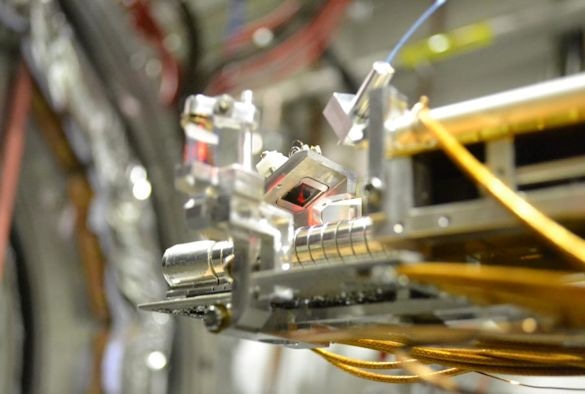Sep 15 2016
The University of Liverpool is leading a £3.2million EU project that will carry out interdisciplinary antimatter research and training in the latest scientific and technical developments in the field.
 Antihydrogen production region in the AEgIS experiment. Image courtesy of Michael Doser, CERN.
Antihydrogen production region in the AEgIS experiment. Image courtesy of Michael Doser, CERN.
AVA (Accelerators Validating Antimatter physics) consists of four universities (Liverpool, Manchester, Sussex and Aarhus), eight national and international research centres and 13 partners from industry, and brings together a wealth of European expertise in antimatter research.
The project will support a connected R&D program across three scientific work packages. The first one focuses on facility design and optimization, addressing beam life time and stability issues in lowest energy storage rings, as well as beam cooling, deceleration and extraction processes.
The second addresses the design, development and testing of novel beam diagnostics and in particular the establishment of a dedicated test stand, to fully determine the characteristics of an antiproton beam. The third package will enable low energy antimatter experiments into beyond state-of-the-art beam handling, storing and analysis techniques.
In addition, AVA will establish a new European training network for partners and the wider scientific community to access the latest developments in antimatter research. Consisting of international schools, workshops and conferences, AVA will offer a combination of local and network-wide training sessions which includes both existing schemes at the different partner institutions, and new training opportunities which no single partner alone could offer.
Hands-on training on accelerator facilities provides a unique opportunity not available within traditional PhD projects and it is anticipated that the strong presence of the industry sector in the consortium will facilitate spin-off developments.
Professor Carsten Welsch, Head of the Department of Physics and coordinator of AVA said: “Antimatter experiments are at the cutting edge of science. They are, however, very difficult to realize and have been limited by the performance of the only existing facility in the world, the Antiproton Decelerator at CERN.
“This year the new Extra Low Energy Antiproton ring (ELENA) is being commissioned at CERN and will be a critical upgrade to this unique facility. This will significantly enhance the beam quality and enable new experiments. In addition, there are exciting long-term prospects through opportunities a future low energy antimatter facility could provide as part of the FAIR research centre in Germany.”
He added: “In Liverpool, we will recruit three Fellows through the AVA project who will work across all work packages. They will carry out studies into beam life time and stability, investigate into novel monitors that can characterise beams of these exotic particles more fully, and they will develop experiments that address the collision dynamics of correlated quantum systems. This is an excellent match to the Department of Physics’ research strategy and will allow them to make important contributions to the field of antimatter research.”
More information on the Fellowships available to early career researchers, and potential PhD opportunities, is available at the project website: http://www.ava-project.eu/